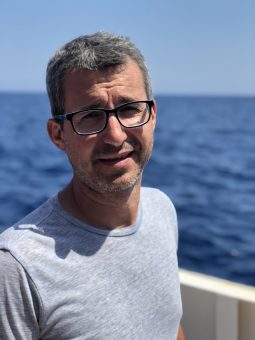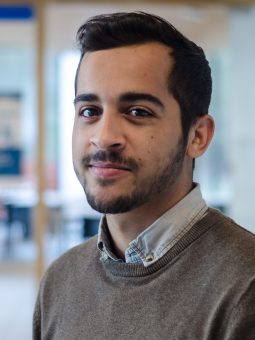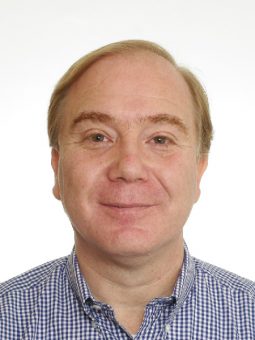Angela Schottenhammer, historian and sinologist, is a professor of Chinese Middle Period & Early Modern World History. Her research during the last decade focused mainly on maritime cross-cultural and commercial interactions, Silk Road Studies, and the history of science and knowledge transfer, especially in the fields of medicine and historical geography.
Project Team
The scholars contributing to the ERC AdG Transpacific
ERC Transpacific
Team
Principal Investigator
Postdoc Researcher
Wim De Winter is a world and maritime historian specialized on the maritime worlds of the Indian & Pacific Oceans. His research focuses on a global, micro-historical approach of cross-cultural interactions in early modern Asia, and on colonial exoticism and the perception of environment. He currently mainly looks at informal agency, piracy, smuggling, and navigational practices in the Transpacific maritime world (16th-18th centuries).
Jose Casabán, a maritime archaeologist and historian, is a Postdoctoral Research Associate at the Institute of Nautical Archaeology (USA). He conducts archaeological and archival research on the history, design, and construction of 16th and 17th Iberian ships, especially Spanish galleons, and Iberian seafaring.
Elke Papelitzky received her PhD from the University of Salzburg (2017) and is currently a postdoctoral researcher at KU Leuven. She is particularly interested in the Early Modern East Asian view of the (maritime) world, the history of mapmaking, the history of science and knowledge, and the relations between East and Southeast Asia.
Mariana Sánchez received her Ph.D. from University Paris Cité in 2022 and is currently a postdoctoral researcher at KU Leuven.Her research is concerned with the Early Modern Hispanic World and with how natural history was set as an early modern discipline, she is more broadly interested in the history of alchemy and medicine, and the history of science and knowledge.
Mathieu Torck is a sinologist who works at the intersection between maritime, medical and botanical history as well as the history of science and knowledge transfer of early modern China and the world in a comparative and cross-cultural perspective. He studies risk and hazard factors in the human environment interaction and in particular pursues a qualitative investigation of shipboard diets as well as traditional modes of water supply during voyages in the Indo-Pacific area in the context of the Manila Galleon Trade.
Kimura Jun, maritime archaeologist and faculty member of the Department of Maritime Civilizations at Tokai University, focuses on the archaeology of early modern Asian ships and Spanish galleons sunken in the Asian and Pacific waters, including the examination of shipbuilding architecture, cargo objects, and related cross-cultural knowledge transfer.
Geoinformaticians (UGent)
Samuel was part of our team between September 2020 and August 2022. He worked on creating a relational, spatio-temporal project database, including geovisualizations and maps.
Kenzo Milleville is a PhD Researcher at Ghent University for IDLab & CartoGis since the end of 2018 with an interest in AI, computer vision, unsupervised learning, and geospatial data procesing. He will be focusing on the analysis and visualization of the Transpacific spatiotemporal database.
PhD Students
Jasmin Law Wai Tan, Mphil in Chinese language and literature from the Chinese University of Hong Kong (CUHK), is currently writing her PhD dissertation on “The Formation and Characteristics of the Notion of “Guangdong Culture” during the Ming-Qing Transition”. Guangzhou, a vital battlefield of the Southern Ming forces against the Qing, was also an important port city that in China’s overseas trading network, where intellectuals and Ming loyalists assembled, individuals like Qu Dajun 屈大均 (1630-1696), author of a local history entitled Guangdong xinyu 廣東新語. She investigate how these Ming loyalists took advantages of Cantonese geographic location and cultural resources to construct a local history.
Juan Carlos González Balderas graduated in 2020 with a Master’s degree in Iberian and Ibero-American Studies. During his master program, he developed a scientific curiosity in the contacts between the Spanish colonies in America and their counterparts in Asia and the cultural, human, scientific, and technological exchanges resulting from transpacific trade. From December 2021 on, he joined the ERC Transpacific project, focusing on the circulation of Asian goods throughout the American Pacific, including their impacts on colonial Lima and its hinterland (Pisco, Arica, and Potosi) around the 18th century. Ultimately, the project aims to map the circulation of Asian commodities and their impacts throughout Peruvian colonial society, based on information collected from wills, auctions, and dowry records in various historical archives in Spain, Peru, Mexico, Chile, and Bolivia.

Cynthia Yeung
In 2022, Cynthia Yeung Sin Ting obtained her master’s degree in Asian Studies at Leiden University with a master’s thesis on the Chinese experience in West Borneo, 1850-1854. She is also conducting research as volunteer at Research Center for Material Culture (RCMC) in the Netherlands, where she has been responsible for research on the invention and complex development of ideas of “China” and “Chineseness” worldwide. From 2023 on, she will join the research group of TRANSPACIFIC as a PhD fellow at KU Leuven, under the supervision of Prof. Angela Schottenhammer. She will examine documentation on the use and circulation of plants, herbs, medicines, and disease imported from the “New World” into coastal China and their impacts on the local societies during the 17th and 18th centuries.
Externally Affiliated Members
Ignacio Chuecas, full Professor and CIDOC Researcher at the Faculty of Humanities and Communications, Finis Terrae University (Santiago de Chile). He investigates the social history of the Hispanic American imperial borders and peripheries during the early modern period (16th-18th centuries), with an emphasis on colonial and religious phenomena. He is supervisor of the Fondecyt project “Portuguese between the Kingdoms of Pirú and the Great Kingdom of China (16th-17th centuries).
















